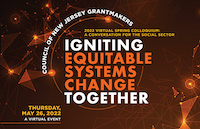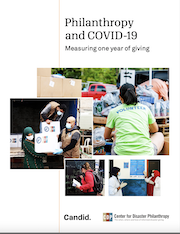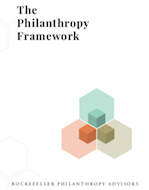Site Search
- resource provided by the Forum Network Knowledgebase.
Search Tip: Search with " " to find exact matches.
A CNJG member received an application from a school district, and wanted to know if others granted funds to a school district, and what other funders learned from granting to a district.
Igniting Equitable Systems Change Together

Date: Thursday, May 26
Time: 1:00 to 5:00 p.m.
On May 26, the Council brought together recognized thought leaders from philanthropy and nonprofits for a conversation exploring how the social sector can advance systems change.
Grantmakers and nonprofits grapple with complex, structural issues every day, and take on the difficult questions to move our collective work forward.
During a dynamic discussion, panelists shared strategies to empower proximate leaders, remove structural barriers and build the capacity of grassroots organizations, and shift mental models to challenge assumptions and strengthen nonprofit-funder relationships. After the panel, case study presenters highlighted three local examples of systems change, emphasizing the importance of cross-sector collaboration, collective action, and community engagement. Then, attendees gathered together for small group discussions to unpack key takeaways and discuss their own successes and challenges with systems change.
One of the most highly regarded convenings for social sector leaders in the state, the 2022 Virtual Spring Colloquium considered the power and cultural shifts needed to advance systems change through philanthropic and nonprofit partnership.
Attendees can revisit Whova to access event features such as session recordings, exhibitor virtual booths and sponsor pages, NJ Poetry Out Loud performances, and more.
| Agenda | |
| 1:00 - 1:30 pm: | Opening Session Featuring Sponsors & Exhibitors |
| 1:30 - 2:00 pm: | Break & Independently Visit with Sponsors & Exhibitor Virtual Booths |
| 2:00 - 3:30 pm: | Panel Discussion & Case Study Presentations - Igniting Equitable Systems Change Together |
| 3:30 - 4:00 pm: | Small Group Discussions |
| 4:00 - 4:15 pm: | Break & Independently Visit with Sponsors & Exhibitor Virtual Booths |
| 4:15 - 5:00 pm: | Networking Reception Featuring NJ Trivia |

These articles have a philanthropic focus. We encourage grantmakers to read, share, and use strategies detailed here.
5/13/22 - ABC News: Two New Jersey towns illustrate the race gap in the COVID pandemic
NJTV: LIVE UPDATES: Tracking the Coronavirus in New Jersey
3/16/21 – Denver Post: On Philanthropy: Pandemic puts nonprofits in peril – what donors can do
8/26 – Center for Disaster Philanthropy: $12 Billion Pledged Worldwide to Fight COVID-19 through June 2020
8/25 – Generocity: Changing Metrics for Impact: The Emergence of a New Donor-Grantee Business Model
8/19 – Good News Network: Generous American Are Giving More to Charities Through The Pandemic, Survey Says
6/8 – Chronicle of Philanthropy: How Foundations Can Make Covid Research Grants More Equitable
6/5 – Governing Magazine: The America Ethos and the Betrayal of Expertise
5/19 – Nonprofit Quarterly: COVID-19 Calls for Philanthropy to Redefine Urgency
5/13 – Nonprofit Quarterly: Will Philanthropy Stand Up for Black America?
5/11 – Nonprofit Quarterly: Deer Eyes, Circle Mind: Reflections on Pandemic & Philanthropy
5/8 – Inside Philanthropy: Pandemic Philanthropy: Moving From Relief to Power
5/5 – NY Times: In Philanthropy, Race Is Still a Factor in Who Gets What, Study Shows
5/5 – Funders Together to End Homelessness: COVID-19 Response and Recovery: Recommendations for Philanthropy to Support Immediate Needs and Long-Term Solutions to End Homelessness
5/5 – Chronicle of Philanthropy: Op-Ed: Flexibility for Grantees Is Not Enough. Let Them Decide Where the Money Goes
5/5 – Chronicle of Philanthropy: Op-Ed: Change Is Too Rapid in Covid-19 Era to Tie Nonprofits’ Hands With Old Rules
5/4 – Bridgespan Group: Racial Equity and Philanthropy: Disparities in Funding for Leaders of Color Leave Impact on the Table
5/4 – Stanford Social Innovation Review: Overcoming the Racial Bias in Philanthropic Funding
5/1 – Stanford Social Innovation Review: For a More Equitable America, Understand Race and Racism as Actions We Do and Can Undo
4/30 – National Committee for Responsive Philanthropy: Large Funder Quadruples its giving in response to COVID-19
4/30 – Chronicle of Philanthropy: How the 25 Biggest Grantmakers are Responding to the COVID Crisis
4/30 – Chronicle of Philanthropy: In Covid-19 Crisis, Philanthropy’s Attention Must Focus on People With Disabilities
4/30 – Inside Philanthropy: A Time for Reform: Philanthropy and the Push for Better State Policymaking
4/28 – Newsweek: Why the Coronavirus Pandemic is Philanthropy's Big Moment
4/23 – Bridgespan Group: Want to Support Your Community’s Equitable Recovery from COVID-19? Invest in Child Care
4/21 – Center for Effective Philanthropy: Essential Questions for Foundation Boards in a Time of Crisis
4/20 – LA Times: Charity is off the charts amid the coronavirus. Is that a sign of America’s strength or weakness?
4/20 - Nonprofit Times: Foundations Paying Out, Expect Deep Recession (quotes from Community Foundation of New Jersey)
4/17 - Nonprofit Quarterly: Why Grantmakers Need to Break Their Restriction Habit—Permanently
4/16 - Chronicle of Philanthropy: Philanthropy’s Stimulus Plan Must Bolster Democracy
4/16 - Nonprofit Quarterly: How Philanthropy Can Support Black Workers
4/15 - Candid.org: A Call for COVID-19 Grants Data
4/15 - Chronicle of Philanthropy: In This Crisis, Philanthropy Must Tackle 3 Existential Challenges All At Once
4/14 - Bridgespan Group: Four Ways for Community-Focused Philanthropy to Confront the Coronavirus Crisis
4/9 - Inside Philanthropy: COVID and the Count: Funders Confront New Challenges to the 2020 Census
4/9 - Forbes: COVID-19 And Aging: What Can Philanthropy Do?
4/7 - Chronicle of Philanthropy: The Coronavirus Crisis Has Changed How I View What Matters in Philanthropy
4/7 - App.com: Coronavirus: 10 ways to avoid becoming victim of a scam
4/7 - Washington Post: Coronavirus is a Totally Different Disaster for Philanthropies to Handle
4/6 - Chronicle of Philanthropy: Small Nonprofits Struggle to Get Payroll Loans in New Federal Program
4/6 - Chronicle of Philanthropy: Foundations and Nonprofits See Crisis as Opportunity to Advance Equity
4/3 - Chronicle of Philanthropy: What Philanthropy Can Do Now to Promote Education Equity After the Pandemic
4/2 - Inside Philanthropy: The Hardest Hit: Who is Supporting Communities of Color During COVID-19?
4/2 - Nonprofit Quarterly: Philanthropy, Meet Our Matrix Moment: Which Pill Will You Choose?
4/1 - Chronicle of Philanthropy: Grant Maker Dilemma: Spend More Now or Protect Shrinking Endowments?
4/1 - Chronicle of Philanthropy: Foundations Adopt Policies to Move More Money Faster, and With Fewer Restrictions
4/1 - NJ Spotlight: A Coronavirus Checklist to Help Keep NJ Residents Informed
3/30 - Nonprofit Quarterly: COVID-19: Using a Racial Justice Lens Now to Transform Our Future
3/26 - NJ.com: City of Newark Creates $6 million fund for Non-Profits, arts organizations, resident, businesses, and homeowners
3/23 - Chronicle of Philanthropy: Federal Aid Plan for Nonprofits Needs More Input From Black-Led Organizations
3/20 - Nonprofit Quarterly: A Growing Group of Foundations Pledge ‘No Business as Usual’
3/20 - Chronicle of Philanthropy: Senate Bill would create ‘Universal Deduction’ & Expand Loans for Nonprofits
3/20 - Asbury Park Press: Digital Divide in Schools Will Affect Web-Only Lessons
3/17 - Chronicle of Philanthropy: Grantmaker Responses for Nonprofits in Need Vary Widely
3/17 - Trust-based Philanthropy Project: Philanthropy Needs To Trust Nonprofits Now More Than Ever
3/16 - Exponent Philanthropy: Market Volatility in the Face of COVID-19
3/16 - Philadelphia Inquirer: Free Wifi from Comcast
3/16 - Inside Philanthropy: Philanthropy Has a Duty to Respond Quickly to the COVID-19 Outbreak. Here’s How We Can Do It
3/16 - NJBiz.com: NJ Government recommendations on March 16, 2020
3/13 - Chronicle of Philanthropy: As Disasters Go, Coronavirus Impact on Philanthropy Unprecedented and ‘Crazy’
3/13 - Bloomberg: Nonprofits Prepare for Worst with Wealthy Losing Billions
3/12 - Forbes: Philanthropy: COVID19 Doesn’t Need to Slow You Down
3/12 - Inside Philanthropy: On the Frontlines of a Pandemic, Local Philanthropy Scrambles to Respond
3/12 - NorthJersey.com: Many seniors face coronavirus fears while cut off from activities and social networks
3/12 - Independent Sector/Chronicle of Philanthropy: A Novel Opportunity to Strengthen Public Trust in the Nonprofit World
3/12 - NJ Spotlight: Sick Leave in NJ, What the Law Provides
3/12 - NJ Spotlight: Experience with Virtual Snow Days Helps NJ School Prepare for COVID-19 Closures
3/12 - Chronicle of Philanthropy: Coronavirus ‘Rapid Response’ Funds Proliferate as Threat Grows
3/11 - NJ.com: NJ schools feed 500K kids for free. What happens if coronavirus closes them?
3/11 - Daily Beast: Will Coronavirus make America finally care about the homeless
3/11 - Chronicle of Philanthropy: Coronavirus Is Hard on Nonprofits That Rely on Events
3/11 - Nonprofit Quarterly: Nonprofits Who Can’t Cancel: The Ones that Serve Those at Greater Risk of COVID-19
3/10 - Chronicle of Philanthropy: As Coronavirus Threat Continues, Experts Tell Nonprofits to Shore Up Reserves
3/9 - Nonprofit Times: Lessening the Risk of Coronavirus at Nonprofits
3/9 - Nonprofit Quarterly: Community Healthcare Centers Funding at Risk at Time of Health Peril
3/9 - Chronicle of Philanthropy: 6 Steps for Grant Makers to Take Now to Ensure Nonprofits Recover From Coronavirus Spread
3/8 - ROI-NJ: NJ Insurers Announce Coverage Related to Coronavirus
3/8 - Nonprofit AF: A few things for nonprofits and foundations to consider in light of the Coronavirus
3/5 - Washington Post: RWJF CEO Pens Opinion Piece on Coronavirus
3/5 - Chronicle of Philanthropy: Coronavirus Giving Tops $1 Billion Worldwide
3/4 - Chronicle of Philanthropy: Nonprofits Work to Protect Employees and Volunteers as Coronavirus Threat Grows
3/3 - Candid.org: Funders Respond to Coronavirus
3/3 - CDNet: Tech Tools Offered for Free During Outbreak
3/2 - FSG: COVID-19 – Seven Things Philanthropy Can Do by Lauren Smith, MD, MPH
3/2 - Chronicle of Philanthropy: Nonprofit Conference Attendees Worry About Coronavirus
2/18 - Professional Convention Management Association: Is Your Event (if cancelled) Covered by Insurance?
CNJG provides this information free to the philanthropic community. If you are not a CNJG member, please join so you can take full advantage of the many benefits of membership and help underwrite the cost of services like this.
Two different CNJG members queried the CEO listserve on how/when/how to return to the office following the COVID-19 pandemic. CNJG staff compiled the answers from the responding members removing identifying information of the respondents.

Steering Committee
Jorge Cruz, Executive Director, LISC Greater Newark
Linda Czipo, President & CEO of the New Jersey Center of Nonprofits
Jackie Edwards, Executive Director, Parents Inc of NJ
Victoria Fernandez, Director of Thriving Communities, Grunin Foundation; and Co-Founder, Nonprofit Professionals of Color Collective
Tyneisha Gibbs, Founder and Principal Consultant of 144th & Vine; and Co-Founder, Nonprofit Professionals of Color Collective
Theresa Jacks, President and CEO, Council of New Jersey Grantmakers
Bridget Phifer, Chief Executive Officer, Parkside Business & Community in Partnership
Rosalía Velázquez, Director of Strategic Partnerships, New Jersey Center of Nonprofits
Advisory Group
Keith R. Adams, Executive Director, NJVOAD
Carin Berkowitz, Executive Director, New Jersey Council for the Humanities
Elsa Candelario, Professor of Professional Practice, Latino/a/x Initiatives for Service, Training, and Assessment, Rutgers School of Social Work
Jane Cohen, Executive Director, Governor’s Office of Climate Action and the Green Economy
René O. Deida, Director, Corporate and Community Engagement, Prudential Financial, Inc.
Hans Dekker, President, Community Foundation of New Jersey
Craig Drinkard, Co-Executive Officer, Victoria Foundation
Bill Engel President, The Union Foundation
Andy Fraizer Executive Director, Community Foundation of South Jersey
Laurie Goganzer, President and CEO, YMCA of Greater Monmouth County
Jeremy Grunin, President, Grunin Foundation
Bob Guarasci, Founder & CEO, New Jersey Community Development Corporation
Susan Hoskins, Executive Director, Friends Foundation for the Aging
Sharnita C. Johnson, Vice President of Strategy, Impact and Communication, Victoria Foundation
Elaine E. Katz, Sr. Vice President, Kessler Foundation
Eddie LaPorte, Director, New Jersey Office of Faith Based Initiatives
Taneshia Nash Laird, President and CEO, Newark Symphony Hall
Tammy Rice Herman, Director of Grants & Strategies, New Jersey State Council on the Arts
John Thurber, Partner, Br'Island Group
Keith Timko, Executive Director & CEO, Support Center
Sandra Toussaint, President & CEO, United Way of Greater Mercer County
Allison Tratner, Executive Director, New Jersey State Council on the Arts
Mark Valli, CEO, NORWESCAP
Margaret Waldock, Executive Director, Duke Farms
Catherine Wilson, President & CEO, United Way of Greater Newark
Doing Good Better, a partnership of the Council of New Jersey Grantmakers and the New Jersey Center for Nonprofits, is a community of funders and nonprofits taking action against the power imbalances and racial inequities in philanthropy, nonprofits, and government.
A CNJG corporate member asked for help with the scenario in which a corporate policy of not supporting religious organizations in their grantmaking, causes problems helping during a disaster in an urban or rural area, when the program that is delivering the disaster relief is based within a church. They want to work with those programs (a church serves as the program’s fiscal sponsor) who support efforts for hunger, homelessness, substance abuse recovery, racial equity, etc. as long as they do not discriminate and do no limit it to their own congregations. The request for policy samples to work around this religious organization hurdle as long as there is no discrimination or funding the actual church’s worship, was compelled by CNJG staff and is listed here.
Impact 100 Garden State, an all-women organization for collective giving and a fund at the Community Foundation of New Jersey, has entered a record-breaking year as it celebrates its 10th anniversary of giving. The organization has announced:
- 364 members, the biggest number ever
- $364,000 to give in grants in 2022, the highest amount ever
- An 85% renewal rate and 64 new members, despite the challenges of the pandemic
- Two special 10th Anniversary Grants of $20,000 each, one in the area of Arts & Culture and the other in the category of Environment, Preservation & Recreation, to be awarded in October 2022.
At its Annual Awards Meeting on June 9th, Impact 100 Garden state awarded $100,000 in grants.
By the end of 2022, Impact 100 Garden State will have awarded more than $2.8 million to nonprofits in its service area of Morris, Passaic, Somerset, Sussex and Union Counties.
“As we celebrate our tenth year of grant-making, I continue to be amazed by the collective womanpower of our members, which makes these grants possible,” says Impact 100 Garden State President Debby Seme. “Our ability to make a significant impact in our communities begins with individual members’ donations and continues through outreach to nonprofits, membership recruitment and engagement, grant evaluation and grant oversight. We couldn’t be more proud to support these outstanding organizations.”
Bank of America announced Wednesday that it has made more than $1.5 million in grants to 28 New Jersey nonprofits to help drive economic opportunity for individuals and families.
The grants focus on workforce development and education to help individuals chart a path to employment and better economic futures, as well as basic needs fundamental to building lifelong stability, such as access to food.
While New Jersey’s economy is recovering from the height of the COVID-19 pandemic, the state still trails the nation in terms of employment and job creation. According to the U.S. Bureau of Labor Statistics, New Jersey’s unemployment rate is 4.1%, compared with the national average of 3.6%.
Employment is a key driver of economic mobility in New Jersey.
Bank of America New Jersey President Alberto Garofalo said that is why the bank is focused on building pathways to employment by supporting a range of workforce development and educational opportunities that will help vulnerable individuals and families stabilize and advance.
“We’ve chosen to partner with nonprofits that address the most critical issues facing New Jersey, including workforce development, food insecurity and economic and social progress,” he said. “Our philanthropic investment in these organizations helps us deploy capital locally, where it will have the most impact and build sustainable communities.”

In this webinar presented by Grantmakers Concerned with Immigrants and Refugees, funders will learn from experts on the ground about their efforts to champion universal representation and how philanthropy can resource and support their work.
Universal Representation–as a principle and policy objective–ensures that every person, regardless of immigration status, has access to due process. Having access to legal representation makes a sizeable difference in an individual’s case. For example, asylum seekers are five times more likely to win their case for asylum if they have legal counsel. Yet there continue to be systemic inequities, with upwards of 70% of immigration cases lacking legal representation.
Not having an attorney has also been shown to have significant negative effects on the health and well-being of immigrants and their families. Areas of impact can include loss of income, degradation of mental health, and loss of access to medical care. Although having legal representation does not guarantee the outcome of a case, it can reduce harm and ensure that the dignity of individuals is protected.
Across the nation, organizations at the local and state levels are using a variety of tools and approaches to advance the goal of universal representation. In this webinar, funders will learn from experts on the ground about their efforts to champion universal representation and how philanthropy can resource and support their work.
COST: Free for CNJG Members and Non Member Grantmakers
